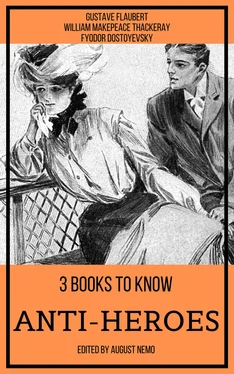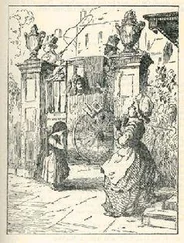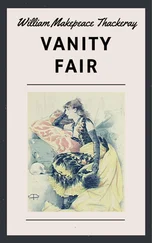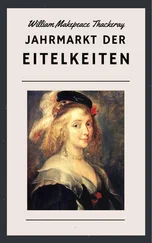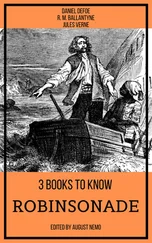With Phil, and at the age of fifteen, I was a more accomplished man than either of my cousins; and I think Nature had been also more bountiful to me in the matter of person. Some of the Castle Brady girls (as you shall hear presently) adored me. At fairs and races many of the prettiest lasses present said they would like to have me for their bachelor; and yet somehow, it must be confessed, I was not popular.
In the first place, every one knew I was bitter poor; and I think, perhaps, it was my good mother’s fault that I was bitter proud too. I had a habit of boasting in company of my birth, and the splendour of my carriages, gardens, cellars, and domestics, and this before people who were perfectly aware of my real circumstances. If it was boys, and they ventured to sneer, I would beat them, or die for it; and many’s the time I’ve been brought home well-nigh killed by one or more of them, on what, when my mother asked me, I would say was ‘a family quarrel.’ ‘Support your name with your blood, Reddy my boy,’ would that saint say, with the tears in her eyes; and so would she herself have done with her voice, ay, and her teeth and nails.
Thus, at fifteen, there was scarce a lad of twenty, for half-a-dozen miles round, that I had not beat for one cause or other. There were the vicar’s two sons of Castle Brady—in course I could not associate with such beggarly brats as them, and many a battle did we have as to who should take the wall in Brady’s Town; there was Pat Lurgan, the blacksmith’s son, who had the better of me four times before we came to the crowning fight, when I overcame him; and I could mention a score more of my deeds of prowess in that way, but that fisticuff facts are dull subjects to talk of, and to discuss before high-bred gentlemen and ladies.
However, there is another subject, ladies, on which I must discourse, and THAT is never out of place. Day and night you like to hear of it: young and old, you dream and think of it. Handsome and ugly (and, faith, before fifty, I never saw such a thing as a plain woman), it’s the subject next to the hearts of all of you; and I think you guess my riddle without more trouble. LOVE! sure the word is formed on purpose out of the prettiest soft vowels and consonants in the language, and he or she who does not care to read about it is not worth a fig, to my thinking.
My uncle’s family consisted of ten children; who, as is the custom in such large families, were divided into two camps, or parties; the one siding with their mamma, the other taking the part of my uncle in all the numerous quarrels which arose between that gentleman and his lady. Mrs. Brady’s faction was headed by Mick, the eldest son, who hated me so, and disliked his father for keeping him out of his property: while Ulick, the second brother, was his father’s own boy; and, in revenge, Master Mick was desperately afraid of him. I need not mention the girls’ names; I had plague enough with them in after-life, Heaven knows; and one of them was the cause of all my early troubles: this was (though to be sure all her sisters denied it) the belle of the family, Miss Honoria Brady by name.
She said she was only nineteen at the time; but I could read the fly-leaf in the family Bible as well as another (it was one of the three books which, with the backgammon-board, formed my uncle’s library), and know that she was born in the year ‘37, and christened by Doctor Swift, Dean of St. Patrick’s, Dublin: hence she was three-and-twenty years old at the time she and I were so much together.
When I come to think about her now, I know she never could have been handsome; for her figure was rather of the fattest, and her mouth of the widest; she was freckled over like a partridge’s egg, and her hair was the colour of a certain vegetable which we eat with boiled beef, to use the mildest term. Often and often would my dear mother make these remarks concerning her; but I did not believe them then, and somehow had gotten to think Honoria an angelical being, far above all the other angels of her sex.
And as we know very well that a lady who is skilled in dancing or singing never can perfect herself without a deal of study in private, and that the song or the minuet which is performed with so much graceful ease in the assembly-room has not been acquired without vast labour and perseverance in private; so it is with the dear creatures who are skilled in coquetting. Honoria, for instance, was always practising, and she would take poor me to rehearse her accomplishment upon; or the exciseman, when he came his rounds, or the steward, or the poor curate, or the young apothecary’s lad from Brady’s Town: whom I recollect beating once for that very reason. If he is alive now I make him my apologies. Poor fellow! as if it was HIS fault that he should be a victim to the wiles of one of the greatest coquettes (considering her obscure life and rustic breeding) in the world.
If the truth must be told—and every word of this narrative of my life is of the most sacred veracity—my passion for Nora began in a very vulgar and unromantic way. I did not save her life; on the contrary, I once very nearly killed her, as you shall hear. I did not behold her by moonlight playing on the guitar, or rescue her from the hands of ruffians, as Alfonso does Lindamira in the novel; but one day, after dinner at Brady’s Town, in summer, going into the garden to pull gooseberries for my dessert, and thinking only of gooseberries, I pledge my honour, I came upon Miss Nora and one of her sisters, with whom she was friends at the time, who were both engaged in the very same amusement.
‘What’s the Latin for gooseberry, Redmond?’ says she. She was always ‘poking her fun,’ as the Irish phrase it.
‘I know the Latin for goose,’ says I.
‘And what’s that?’ cries Miss Mysie, as pert as a peacock.
‘Bo to you!’ says I (for I had never a want of wit); and so we fell to work at the gooseberry-bush, laughing and talking as happy as might be. In the course of our diversion Nora managed to scratch her arm, and it bled, and she screamed, and it was mighty round and white, and I tied it up, and I believe was permitted to kiss her hand; and though it was as big and clumsy a hand as ever you saw, yet I thought the favour the most ravishing one that was ever conferred upon me, and went home in a rapture.
I was much too simple a fellow to disguise any sentiment I chanced to feel in those days; and not one of the eight Castle Brady girls but was soon aware of my passion, and joked and complimented Nora about her bachelor.
The torments of jealousy the cruel coquette made me endure were horrible. Sometimes she would treat me as a child, sometimes as a man. She would always leave me if ever there came a stranger to the house.
‘For after all, Redmond,’ she would say, ‘you are but fifteen, and you haven’t a guinea in the world.’ At which I would swear that I would become the greatest hero ever known out of Ireland, and vow that before I was twenty I would have money enough to purchase an estate six times as big as Castle Brady. All which vain promises, of course, I did not keep; but I make no doubt they influenced me in my very early life, and caused me to do those great actions for which I have been celebrated, and which shall be narrated presently in order.
I must tell one of them, just that my dear young lady readers may know what sort of a fellow Redmond Barry was, and what a courage and undaunted passion he had. I question whether any of the jenny-jessamines of the present day would do half as much in the face of danger.
About this time, it must be premised, the United Kingdom was in a state of great excitement from the threat generally credited of a French invasion. The Pretender was said to be in high favour at Versailles, a descent upon Ireland was especially looked to, and the noblemen and people of condition in that and all other parts of the kingdom showed their loyalty by raising regiments of horse and foot to resist the invaders. Brady’s Town sent a company to join the Kilwangan regiment, of which Master Mick was the captain; and we had a letter from Master Ulick at Trinity College, stating that the University had also formed a regiment, in which he had the honour to be a corporal. How I envied them both! especially that odious Mick as I saw him in his laced scarlet coat, with a ribbon in his hat, march off at the head of his men. He, the poor spiritless creature, was a captain, and I nothing,—I who felt I had as much courage as the Duke of Cumberland himself, and felt, too, that a red jacket would mightily become me! My mother said I was too young to join the new regiment; but the fact was, that it was she herself who was too poor, for the cost of a new uniform would have swallowed up half her year’s income, and she would only have her boy appear in a way suitable to his birth, riding the finest of racers, dressed in the best of clothes, and keeping the genteelest of company.
Читать дальше
